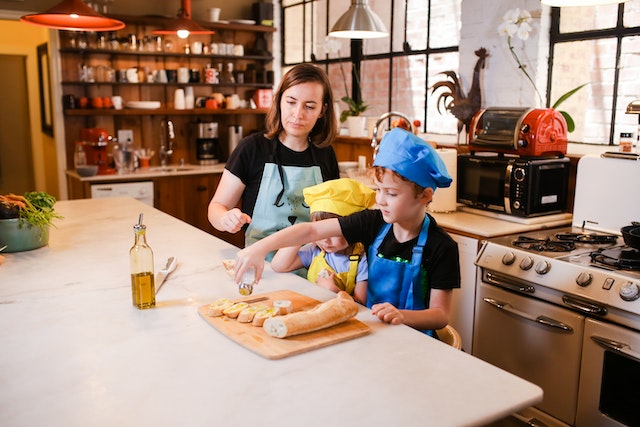Cooking is a wonderful way to spend quality time with your child while teaching them valuable life skills. Not only does it provide an opportunity for bonding, but it also helps children develop important cognitive, motor, and social skills. In this article, we’ll explore the benefits of cooking with children and provide tips on how to get them involved in the kitchen.
Benefits of cooking with children
1. Boosts cognitive development
Cooking requires following a recipe, measuring ingredients, and understanding the chemical reactions that occur during the cooking process. These activities stimulate a child’s brain and help them develop their cognitive skills. Cooking also helps with their comprehension skills, as they learn to follow a step-by-step process and understand the order in which tasks should be completed.
2. Enhances motor skills
Cooking involves a lot of hands-on activities such as mixing, chopping, and stirring. These tasks help children develop their fine motor skills, hand-eye coordination, and dexterity. Stirring the batter, chopping vegetables, and rolling dough all require different hand movements that help strengthen the muscles in their hands and improve their coordination.
3. Builds social skills
Cooking is a great way to teach children about teamwork and cooperation. By working together to create a meal, children learn the importance of communication and collaboration. Cooking also teaches children about sharing and taking turns, as well as practicing good manners and etiquette.
4. Develops a love for healthy eating
Cooking with children provides an opportunity to teach them about healthy eating habits. Children are more likely to try new foods when they are involved in the cooking process. By choosing healthy ingredients and cooking meals from scratch, children learn the importance of eating a balanced diet and making healthy choices.
Recommended reading: 35 Essential Life Skills To Teach Your Child
Recommended reading: 10 Reasons Why Your Child Should Enroll in Cooking Classes
Tips to get your child involved in kitchen
Now that we’ve discussed the benefits of cooking with children, let’s look at some ways you can get your child involved in the kitchen:
1. Choose age-appropriate tasks
Assign tasks that are appropriate for your child’s age and skill level. Younger children can help with simple tasks such as washing vegetables, measuring ingredients, and stirring, while older children can help with more complex tasks such as cutting, grating, and sautéing.
Here is a list of age-appropriate tasks that children can do while cooking:
Toddlers (2-3 years old):
- Washing fruits and vegetables
- Stirring ingredients
- Tearing lettuce for salad
- Sprinkling cheese or toppings on pizza
Preschoolers (4-5 years old):
- Measuring ingredients
- Pouring ingredients into a bowl
- Mashing bananas or avocado
- Kneading dough for bread or pizza crust
- Spreading butter or jam on bread
Elementary schoolers (6-8 years old):
- Cutting soft fruits and vegetables with a plastic knife
- Using a can opener
- Grating cheese
- Mixing ingredients with a whisk or spoon
- Using a garlic press
Tweens (9-12 years old):
- Chopping vegetables with a small knife
- Cooking eggs on the stovetop
- Making a simple salad dressing
- Using an electric mixer
- Using the oven with adult supervision
Teens (13+ years old):
- Using a chef’s knife for chopping
- Sauteing vegetables on the stovetop
- Following a recipe and adjusting seasonings to taste
- Using a slow cooker or pressure cooker
- Baking and decorating a cake
Remember to always supervise children while cooking and use your discretion to determine which tasks are appropriate for your child’s age and skill level.
2. Let them choose the recipe
Let your child choose the recipe they want to cook. This will give them a sense of ownership and help spark their creativity. Make sure the recipe is something they can handle, and consider any dietary restrictions or allergies.
3. Create a fun atmosphere
Cooking should be a fun and enjoyable experience. Play some music, wear aprons, and make it a special occasion. Encourage your child to taste different ingredients and have fun with the process.
4. Give them positive feedback
Be sure to praise your child for their efforts and give positive feedback. This will boost their confidence and encourage them to continue cooking in the future.
5. Teach them kitchen safety
Teach your child about kitchen safety, including how to handle knives and hot surfaces, and the importance of washing their hands before and after handling food.
Recommended reading: What is the Right Age to Enroll Your Child in Cooking/ Baking Classes?
In conclusion, cooking with children is a wonderful way to bond with them while teaching them valuable life skills. By getting them involved in the kitchen, you can help them develop their cognitive, motor, and social skills while also teaching them about healthy eating habits. So, grab your aprons and start cooking!




